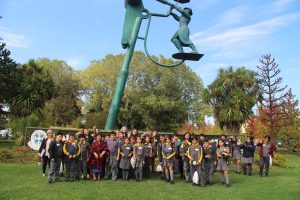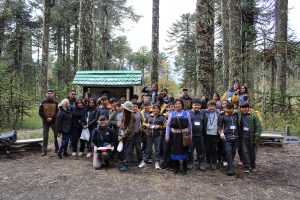Forest fires in South Central Chile have exceeded the historical fifty thousand hectares per year, which has dramatic consequences for the forestry sector and the loss of ecosystem services (for example, carbon sequestration). Under this premise, researchers from the Laboratory of Conservation and Dynamics of Volcanic Soils of the Universidad de la Frontera have been awarded a new initiative of the RINGS OF INVESTIGATION call of the National Agency for Research and Development (ANID).
The project directed by the Director Dr. Francisco Matus, and the Alternate Director Dr. Carolina Merino study the impact of fires on forest degradation through the FiRING project. Together with them, the team of principal investigators of this project, Alejandra Stehr, Rafael Rubilar and Felipe Aburto from the University of Concepción, together with the associated researchers; Claudia Rojas from the University of O’Higgins, and Ignacio Jofré from the University of La Frontera will be part of this project.
Check more details in the following link /http://vrip.ufro.cl/index.php/investigacion/1352-ufro-se-adjudica-cinco-proyectos-anillo-de-investigacion-en-ciencia-y-o-tecnologia- 2021

The objective of FiRING is to investigate the impacts of fires on soil degradation, native forest (Nothofagus spp.) and pine forest plantations (Pinus radiata De Don). Experimental methods at different spatial scales will be combined to understand the processes at the site level and the hydrographic micro-basin. For three years, forest fires will be studied, how they delay the recovery of native vegetation and how soil nutrients are recovered in the southern and Mediterranean areas of Chile. Small plots of controlled fires will be carried out in the micro-watershed. Prior to burning, the plants will be isotopically labeled (carbon, nitrogen, calcium and potassium trace markers to follow the fate of these nutrients applied at the root level. We will also study the impact of fires in a sequence of ages between 0 and 20 years from the first fire. All this information plus that collected from the micro-watersheds will be used to feed simulation models to estimate nutrient and soil losses due to erosion. The effect of fire on forest productivity and therefore carbon sequestration will also be estimated. The project has close national and international collaboration and large national forestry companies. FiRING will generate a solid knowledge of the effect of fire on forest degradation and its effect on the biological, chemical and physical properties of post-fire soil. It will provide technical recommendations that can be incorporated into recovery and conservation management practices.





